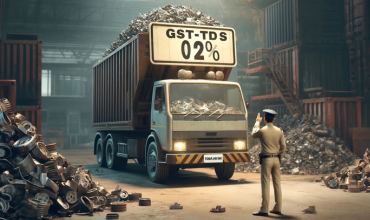What is Reverse Charge Mechanism?
Typically, the supplier of goods or services pays the tax on supply. Under the reverse charge mechanism, the recipient of goods or services becomes liable to pay the tax, i.e., the chargeability gets reversed.
The objective of shifting the burden of GST payments to the recipient is to widen the scope of levy of tax on various unorganized sectors, to exempt specific classes of suppliers, and to tax the import of services (since the supplier is based outside India).
Only certain types of business entities are subject to the reverse charge mechanism.
When is Reverse Charge Applicable?
Section 9(3), 9(4) and 9(5) of Central GST and State GST Acts govern the reverse charge scenarios for intrastate transactions. Also, sections 5(3), 5(4) and 5(5) of the Integrated GST Act govern the reverse charge scenarios for inter-state transactions. Let’s have a detailed discussion regarding these scenarios:
A. Supply of certain goods and services specified by the CBIC
B. Supply from an unregistered dealer to a registered dealer
C. Supply of services through an e-commerce operator
A. Supply of certain goods and services specified by the CBIC
Supply of Goods under RCM
The Goods liable to Reverse Charge has been specified in
- Notif. No. 04/2017-Central Tax (Rate) dt. 28-June-2017 and
- Notif. No. 04/2017-Integrated Tax (Rate) dt. 28-June-2017
as amended, both effective from 01-July-2017
The following are the category of supply of goods which would be liable to reverse charge :
Supply of Services under RCM
The Services under Reverse Charge has been specified in
- Notif. No. 13/2017-Central Tax (Rate) dt. 28-June-2017 and
- Notif. No. 10/2017-Integrated Tax (Rate) dt. 28-June-2017
as amended, both effective from 01-July-2017
The following are the category of supply of services which are be liable to reverse charge :
B. Supply from an unregistered dealer to a registered dealer
Section 9(4) of the CGST Act states that if a vendor is not registered under GST supplies goods to a person registered under GST, then reverse charge would apply. This means that the GST will have to be paid directly by the receiver instead of the supplier. The registered buyer who has to pay GST under reverse charge has to do self-invoicing for the purchases made.
In intra-state purchases, CGST and SGST have to be paid under reverse charge mechanism (RCM) by the purchaser. Also, in the case of inter-state purchases, the buyer has to pay the IGST. The government notifies the list of goods or services on which this provision gets attracted from time to time.
In the real estate sector, the government notified that the promoter should buy inward supplies to the extent of 80% from registered suppliers only. Suppose the purchases from registered dealers shortfall 80%, then the promoter should GST at 18% on the reverse charge to the extent short of 80% of inward supplies. However, if the promoter purchases cement from an unregistered supplier, he must pay tax at 28%. This calculation is to be done irrespective of the 80% calculation.
The promoter is liable to pay GST on reverse charge basis on TDR or floor space index (FSI) supplied on or after 1st April 2019. Even if a landowner is not engaged in a regular business of land-related activities, transfer of development rights by such an individual to the promoter is liable to GST as it is considered as supply of service under section 7 of CGST Act. Also, in case of outward supply of TDR by one developer to another, GST is applicable at 18% on reverse charge.
C. Supply of services through an e-commerce operator
All types of businesses can use e-commerce operators as an aggregator to sell products or provide services. Section 9(5) of the CGST Act states that if a service provider uses an e-commerce operator to provide specified services, the reverse charge will apply to the e-commerce operator and he will be liable to pay GST. This section covers the services such as:
- Transportation services to passengers by a radio-taxi, motor cab, maxi cab and motorcycle. For example – Ola, Uber.
- Providing accommodation services in hotels, inns, guest houses, clubs, campsites or other commercial places meant for residential or lodging purposes, except where the person supplying such service through electronic commerce operator is liable for registration due to turnover exceeding the threshold limit. For example – Oyo and MakeMyTrip.
- Housekeeping services, such as plumbing and carpentering, except where the person supplying such services through electronic commerce operators are liable for registration due to turnover beyond the threshold limit. For example, Urban Company provides the services of plumbers, electricians, teachers, beauticians etc. In this case, Urban Company is liable to pay GST and collect it from the customers instead of the registered service providers.
Also, suppose the e-commerce operator does not have a physical presence in the taxable territory. In that case, a person representing such an electronic commerce operator will be liable to pay tax for any purpose. If there is no representative, the operator will appoint a representative who will be held liable to pay GST.





